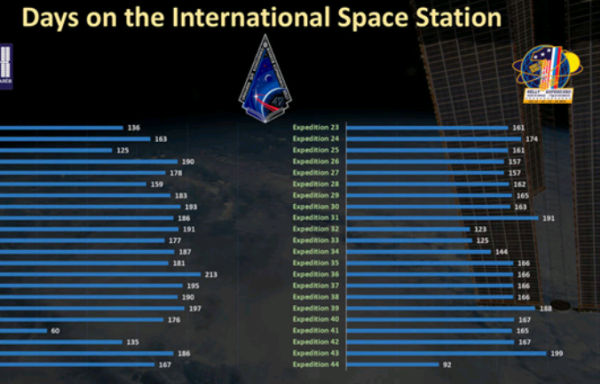
Image source: http://www.theatlantic.com/magazine/archive/2015/01/5200-days-in-space/383510/
The International Space Station which was launched into the Low Earth Orbit way back in 1988 has seen continuous human occupation only since November, 2000. This month, the ISS completed its 15 years of continuous human presence in the outer space. Over the past 15 years, the ISS has hosted more than 200 people from about 15 countries. Apart from playing the host to longest continued human presence, the ISS has also seen the commendable joint efforts of the five Space agencies: NASA, ROSCOSMOS, ESA, CSA and JAXA.

Fig 1. The Space Station has been a gracious host.2
NASA admits that "ISS is as much a human achievement as it is a technological one".3 The ISS Agreement signed by the participating nations on January 29, 1998 stands a testament to the commitment, openness and collaborative intent of the agencies to create a singular, unique technological front for the greater good, advancement. It is for each agency to maintain and run the hardware that the component it provides to the space station as established under the agreement.
As discussed in the earlier writings, over the years, the laws regulating the outer space have come to include and acknowledge the roles played by the private commercial entities in the domain. SpaceX has come to become a prominent player in the industry, and has bagged various NASA contracts made in furtherance of the agency's commitment to the ISS. It very recently got its first contract to provide transport to a team of astronauts to the ISS in 2017.4 A similar contract was awarded to Boeing, as part of a series of 4 orders NASA is to execute under the commercial crew transportation capability contracts. As we grow familiar with a string of contracts being executed between the government agency and the private entities, it is for the laws to be replicated around the world, for increased efficiency and cost reduction.
Interestingly, as we grow to understand the debated concept of the "common heritage of mankind", we see the subtle hint of rebel in fields like, space archaeology. Is it not for us to preserve what we have now, for the future generations? It is a well known fact that one of the winning excuses for the space faring nations to not ratify the Moon Treaty, is this very principle being harbored by the agreement.
A plain reading of the provision of the Moon Treaty, gives the impression of the principle seeking to protect, respect, and meet the interests of human beings independent of any political/sovereign motivation. The five components5 of this principle are:
- No private or public appropriation;
- All representatives must manage resources of such commons area;
- Active sharing of benefits stemming from commons region;
- No weaponry or military installations in commons area; and,
- Preservation of commons for future generation
Over the years there have been demands of a supranational organization for the management of the natural resources in the outer space, yet we have come to address the issues of outer space utilization; manage; and, succeed with multination coordination (co-operation of space programs, the case of ISS). Now with the major participation of commercial entities, appropriation for private gain stands as a very controversial objective.
To think of it, where the commercial entities have been blatantly targeted under the principle, is it justifiable to forbid them? Are the established principles of international law, such as consent based sources of international law, sovereignty5 enough to bring in the distinction? Was it not the great philosopher Friedrich Engels who once said, "freedom is the recognition of necessity" 7 ? It is time that we bring in strict terms of law unifying all the overlapping principles, to bring out clarity. Now that we are 15 years into celebrating the undaunted human spirit, we need to strive harder.
References:
1. http://www.nasa.gov/mission_pages/station/main/onthestation/facts_and_figures.html
2. Ibid.
3. http://www.nasa.gov/mission_pages/station/cooperation/index.html
4. http://timesofindia.indiatimes.com/home/science/SpaceX-gets-first-Nasa-offer-to-ferry-astronauts-to-ISS/articleshow/49900809.cms
5. Jennifer Frakes, The Common Heritage of Mankind Principle and the Deep Seabed, Outer Space, and Antarctica: Will D eveloped and Developing Nations Reach a Compromise?", 21 WILJ 409, (2003).
6. https://en.wikipedia.org/wiki/Common_heritage_of_mankind
7. Garrett Hardin, The Tragedy of the Commons, December 1968
The content of this article is intended to provide a general guide to the subject matter. Specialist advice should be sought about your specific circumstances.

